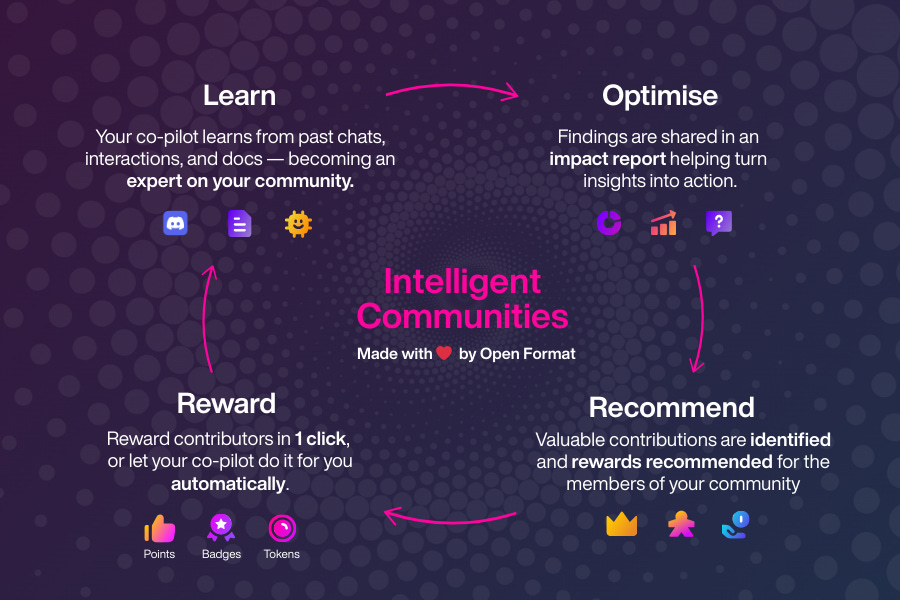Happy Friday! 🌞
Today we’ll be looking at:
How Google are learning to speak the language(s) of the dolphin 🐬
Agents that talk to each other - a big open-source win for Google 🤖
A number of OpenAI’s strategic masterplays 👀
Why Tetris could be the new SaaS 🎮
A bit about our latest product: Intelligent Communities 🔥
Anyway let’s jump in…
Tetris Business Models: The AI Opportunity Most Investors Miss
“But in this new world of AI tech, you get these weirder business models that still make sense, like being a vertically integrated tech convenience store but also selling your tech like a SaaS company. The way you build looks funny compared to previous waves of technology.”
The way digital businesses are being built is (rapidly) changing, and because of this, the different ways value can be captured is changing too.
The Tetris narrative explored in this piece is something we’ve been thinking about and debating internally a lot over the past few weeks, as we discuss different potential token strategies and think about pricing for our Intelligent Communities product.
Only looking at things with the SaaS goggles on is certainly easier, but actually it’s becoming increasingly apparent that to solve the bigger problems, and to scale far beyond our small (but mighty) team, a hybrid approach is required. A Tetris model that combines product and protocol, and one that combines and augments multiple business models.
The added complexity when approaching a Tetris business model is inevitable (and can cause your head to hurt… trust me I know), but if it allows you to create and capture wayyyy more value, and distribute this value in a fair and decentralised way (think tokens…), then it’s 100% worth it.
At least we think it is.
Im sure there will be more about our Tetris-thinking coming your way very soon.

A 101 in consensually acquiring and storing the richest bank of personal data the world has ever seen.
OpenAI have being shipping like MAD in the past fortnight, with the release of their GPT 4.1, 4.1-nano, 4.1-mini, o3 and o4-mini models (I think that’s it…). As awesome as these all are, this is not what we’re going to be talking about.
It’s actually the recent addition of their memory feature, and the HUGE implications this has.
Basically the new memory functionality means that now when you talk to ChatGPT it has context and can directly reference anything you’ve ever told it.
From a user, product and strategy point of view this is EPIC, I’m super impressed.
What concerns me (massively) is the fact that OpenAI completely owns all this data. It’s actually data we’re all giving away completely voluntarily and for free.
Often highly personal and hyper specific data.
Meta/Llama and XAI/Grok approached this data problem (and distribution) by integrating their AI with the social platforms they own. OpenAI are taking quite a different approach…
✔ Offer a service that is incredibly good.
✔ Make sure that the service gets exponentially better as your users give it more context. The more personal and specific the better.
✔ Make it super friendly so that people are more likely to divulge information and treat it as a human/friend/assistant.
❔ Use this hyper-personalised data to ___________
How to counter this:
OpenAI API wrapper with a custom shared memory layer that the user owns.
Who’s building this?
-Ejaaz / @cryptopunk7213
Spoiler alert, you’re about to find out who’s building this 👇
The personalised user data layer
Personalisation, the Sagrada Família of the software world…
After years of building towards ‘ultimate personalisation’ in how we experience the internet, it still feels like a promise that so far has remained undelivered.
But, (as Bob Dylan says) times they are a changing, and with the rise of LLM’s our interactions with apps and intelligence are becoming ever more personalised.
But in order to achieve EPIC levels of personalisation and all the benefits that come with this, you need to understand the user. Like really understand them.
And to understand a user you need data. A tonne of data: all the context about them, their preferences, how they like to interact, learn etc. etc.
And surely the only logical person to own that data would be the user?
This is the problem Plastic Labs is working to solve.
Creating a decentralised layer that allows context-rich user data to become portable between apps.
Simply put, this is user-first personalisation → the right way to do things.
Other articles + videos we’ve found interesting this week…
How Google AI is helping decode dolphin communication → Since 1985 the Wild Dolphin Project (WDP) have collected all sorts of rich data on dolphins. Google have used this model to train ‘Dolphin Gemma’ an AI model aiming to create a shared vocabulary for humans and dolphins. What a time to be alive!
The Agent2Agent Protocol → Google have just announced the A2A protocol. It allows AI agents built with different agent frameworks or models to work together and coordinate between themselves, and importantly do so without directly sharing their internal memory, thoughts, or tools.
Google loses ad tech monopoly case → Another week, another lawsuit against Google — and this time the news is good. This courtroom setback for the tech giant brings us one step closer to regulators forcing a Google breakup and preventing the monopolistic chokehold they have on the advertising industry.
Windsurf: OpenAI’s potential $3B bet to drive the ‘vibe coding’ movement → As OpenAI continue their transition from a model-first ‘AI’ company to a full-stack model and product behemoth, they are looking to acquire distribution channels for their AI. First up: acquire a development platform, Windsurf.
As these intelligence-first companies continue to expand laterally it feels like we are about to see more and more markets dominated by the same few companies. The big 5 of the web2 era, but with 10x broader reach and control? 👀
Power to the people: How LLMs flip the script on technology diffusion → Historically, new technologies benefit businesses long before consumers.
AI is different. By delivering expert‑level (or just sub-expert) insight and skillsets across countless domains, it disproportionately empowers individuals, who typically possess just a handful of specialties, while companies already command many. This means the % improvements companies can see is significantly lower. Power to the individual!
What we’ve been up to…
Another BUSY, busy, busy fortnight. The Open Format team has been smashing it! (If I do say so myself…)
We’ve officially launched v1 of Open Format’s Intelligent Communities. 🥳🔥💪
We’re in closed beta right now, ironing out some bugs with a few of our close partners, but we’ll be rolling it out to many more communities over the next few weeks. You can sign up for early access here, and we’ll be sharing a lot more about the product in Happy Hacking next week.
As you may have seen earlier this week we are officially part of the first Outlier Ventures Post Web Accelerator cohort and we couldn’t be more excited!
We’ve also officially announced a deeper partnership with Aurora which is epic!! You can read more about what we’re up to together here.
That’s all for this week.
If you want more news from us, you can also sign up to our builders newsletter/ community via our website!
Have a great weekend, Dan and the OPENFORMAT team 👋🏽
Join our community
Join our Telegram group, The Format, for relevant news and conversations.
Check out our website (feedback much appreciated!!)
Join our Discord to get all the real-time updates on what is being built with Open Format
Subscribe to our YouTube → we are currently running a build series where we are streaming the whole process as we build our new product in public








